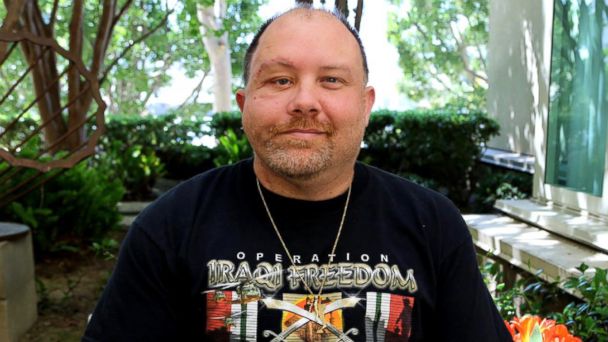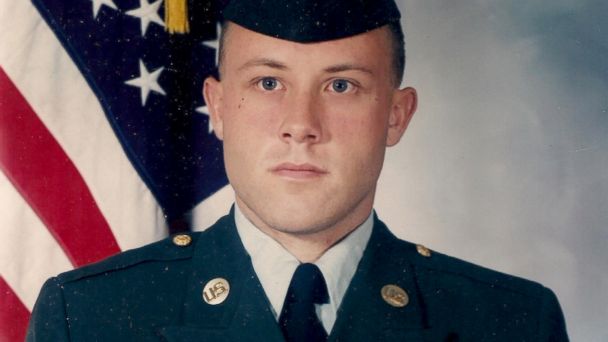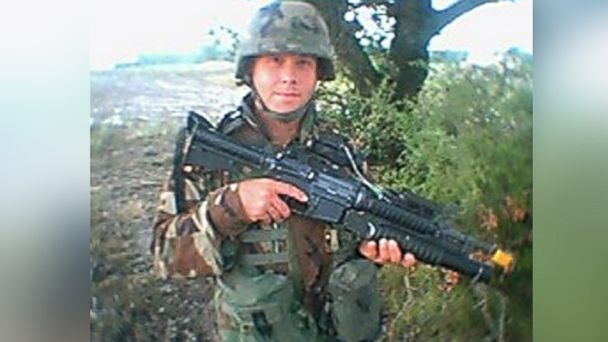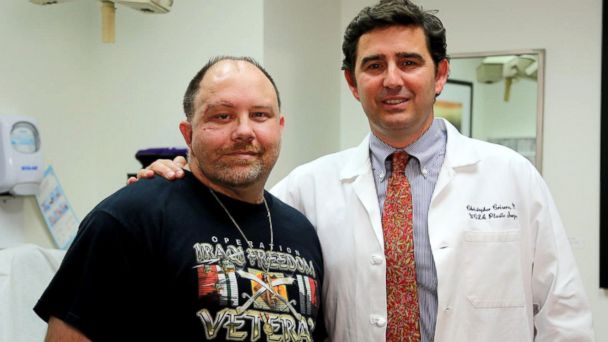UCLA's Operation Mend Brings Back Smile to Iraq War Vet
When U.S. Army Staff Sgt. Jason March visited Operation Mend at the University of California-Los Angeles for the first time, they asked him what he wanted from them. His simple request was to have his smile back.
"I said to them, 'Other organizations, they always want a pictures of you. And I was never able to smile in the pictures because the right side of my face was paralyzed,'" he said.
March, 43, a native of Sacramento, California, who now lives near San Antonio, Texas, had been a combat engineer in charge of a quick response force unit in Iraq.
In August 2006, while leading his platoon to a sniper shooting situation near Fallujah, Iraq, March was hit by a sniper's bullet in the back of the head near his right ear.
That bullet took March off the battlefield and began years of rehabilitation that included dozens of surgeries before he even got to Operation Mend.
"Jason came to us with a number of needs," said Dr. Christopher Crisera, a plastic surgeon who is Operation Mend's co-medical director. "He had a really horrible injury that destroyed vascular structures in his neck and affected the right side of his face as well as bone structure."

(Angel Canales)
March had been standing in the gun turret of a Bradley military vehicle when he was shot.
"We got called out for a sniper shooting in the area and we rolled and sealed off the area," he said. "I happened to stand up and move the crowd out and, in a matter of seconds, the sniper shot me."
The sniper's bullet hit March and shattered his jawbone and teeth, and ripped through muscle and flesh.
"All I remember was the actual thud and blood pouring out," he said.
He was flown to Germany and later taken to Brooke Army Medical Center in San Antonio, Texas.
"I suffered two strokes in-flight and the left side of my body was paralyzed," he said.
He spent the next four months in an induced coma.

Jason March U.S. Army graduation photo in 1997. Jason March
When March woke up at Brooke, the first thing he thought about was his platoon and where he was located.
"I didn't know what to say. I was hooked up to a million tubes. I just wanted to know everything was OK," he said.
Rehabilitation for March was a tough and long process.
"They didn't think I was going to be able to walk, talk or see again," he said. "When you hear something like that in a hospital situation not knowing what's going to happen. You start to not wanting to be around. That's when you need to know that you need help.
"Seeing myself after, the first time ever, I didn't know what to think," he said.
Doctors at Brooke Army Medical Center did face and head reconstruction and spent two years going through surgeries.
"I can't give them more credit for what they've done," he said.
It was at Brooke that his doctor, Col. Robert Hale, commander of the Army's dental and trauma research detachment, referred March to UCLA's Operation Mend.
Since 2007, Operation Mend program has helped wounded soldiers with advanced facial and hand surgery, as well as comprehensive medical and mental-health support for the wounded and their families at no cost.
The program is a collaborative effort between Brooke Army Medical Center (BAMC), the V.A. Greater Los Angeles Healthcare System and UCLA Health System. Veterans have access to the nation's top plastic and reconstructive surgeons. They currently have served 107.
In addition to plastic and reconstructive surgery, Operation Mend provides mental health support for soldiers and their families, orthopedic reconstruction for severely damaged limbs, urologic treatment, otolaryngological care, examination and treatment of reproductive issues, repair of airways and design of new prosthetic ears.

U.S. Army Sgt. Jason March in Iraq in 2006. Jason March
A year after his initial surgeries, March was very happy with the results.
"I was in the mirror at home playing around and I started to move the right side of my face, and I could smile again," he said.
March has had more than 85 surgeries on his face alone since accident in Iraq.
"To deal with something like that, you have to have a great support system and I got a great support system including my family, parents and Operation Mend," he said.
In the past two years, he has undergone seven procedures at Operation Mend and can now smile on both sides of his face.
"A lot of people don't get to have the opportunity to get one-on-one, in-depth with their doctors," March said. "They are like another set of therapists. You trust them, which is one of the life changing things about this place - knowing that you have great care and a great set of hands that are going to take care of you."
At first, March was skeptical about the surgeries at Operation Mend, he said, but it has been a great opportunity.
"They really pulled through and made my dream to smile come true," he said. "Before, it was a lot of people looking at me, staring at me, and I now I feel more confident about what Operation Mend and the surgeons here have done for me. Now I can get up and go and do anything possibly that I want to do," says March.
March's surgeries, he said, brought back his sense of humor.
"It brought back my morale, motivation and made me speak to other people to encourage people and say, 'Look, it is not the end of the line. I no longer care about what people think about how I look. I served my country and I did what I was asked, and I'm proud of what I've done,'" he said. "Life changes in the blink of an eye but you have to pick up the pieces and roll with it."

Jason March with Dr. Crisera, Operation Mend's co-medical director and associate clinical professor of plastic and reconstructive surgery at UCLA. Angel Canales
Before his accident, March said, he was a "lifer" and wanted to retire from the Army.
"Once I hit year 13 I wanted to stay in," he said.
"What I enjoyed the most was teaching," he added. "I enjoyed teaching the younger generation in the Army just like we were taught by the older folks did with me."
March wanted to join the Army to become a combat medic but the opportunity to be a combat engineer was available. He was assigned to the 4 th Infantry E-Company and led a group of soldiers and Bradley fighting vehicles.
Prior to Iraq, March had been deployed to Kosovo, Bosnia, Kuwait and Korea.
After being injured and enduring a long recovery, March wants to help other wounded veteran going through the same thing he went through and still goes through.
"I want to jump out there to help other wounded soldiers that are coming back and hurting and don't know how to deal with it and I've been there and I've done that," he said. "I know how to help."